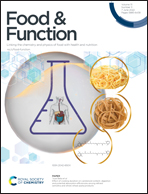Docosahexaenoic acid-acylated curcumin diester alleviates cisplatin-induced acute kidney injury by regulating the effect of gut microbiota on the lipopolysaccharide- and trimethylamine-N-oxide-mediated PI3K/Akt/NF-κB signaling pathway in mice†
Abstract
An increasing number of studies have reported the effects of curcumin (Cur) and docosahexaenoic acid (DHA) on alleviating acute kidney injury (AKI). In this work, we have performed a comparative investigation to determine the effect of dietary DHA-acylated Cur esters, ester derivatives of Cur, and recombination of curcumin and DHA on alleviating acute kidney injury in a mouse model induced by a single intraperitoneal injection with cisplatin (20 mg kg−1). The results showed that the DHA-acylated Cur diesters significantly decreased the abnormally increased blood urea nitrogen, creatinine, lipopolysaccharide (LPS) and trimethylamine-N-oxide (TMAO) in serum caused by AKI. Histopathological results confirmed that DHA-acylated Cur diesters clearly reduced the degree of renal tubular injury. The renal protective effect of the DHA-acylated Cur diester was better than that of the monoester and the recombination of Cur and DHA. Notably, we found that the DHA-acylated Cur diester treatment remarkably changed the relative abundance of microbiota related to LPS and TMAO/trimethylamine (TMA) metabolism. Moreover, dietary DHA-acylated Cur diesters clearly reduced the MDA content and elevated GSH levels in the kidney of AKI mice, as well as changed the fatty acid composition in the kidney. Further mechanism studies showed that DHA-acylated Cur diesters significantly inhibited inflammation, apoptosis and oxidative stress by preventing the LPS and TMAO-mediated PI3K/Akt/NF-κB signaling pathway. The above results indicate that DHA-acylated Cur diesters are a potentially novel candidate or targeted dietary pattern to prevent and treat drug-induced acute kidney injury.



 Please wait while we load your content...
Please wait while we load your content...